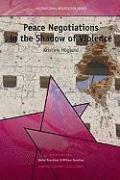Peace Negotiations in the Shadow of Violence
BücherAngebote / Angebote:
International Negotiation Series, 6 (International Studies Library, 6) Attempts to negotiate peace agreements are frequently accompanied by terrorist attacks, political assassinations, and massacres. Why do peace talks sometimes fall apart as a result of violence, while belligerents at other times are brought to the negotiation table in the wake of violence? This book addresses this serious conundrum. Firmly anchored in theories on conflict resolution and negotiation, and drawing on empirical insights from Guatemala, Northern Ireland, South Africa, and Sri Lanka, patterns of actions and responses in the aftermath of violence are analysed. The book uncovers some of the principal conditions explaining the influence of violence on these negotiation processes, and questions the common perception that violence always has a one-sided negative effect on peace processes. Table of Contents PART ONE VIOLENCE AND PEACE PROCESSES 1. Violence: An Impetus or Obstacle to Peace? 2. Fear of Peace, Fear of War PART TWO CASE STUDIES 3. Guatemala: Building Confidence after Violence a. Assassination of Jorge Carpio (July 3, 1993) b. Xamán Massacre (October 5, 1995) c. Kidnapping of Olga de Novella (August 25, 1996) 4. Northern Ireland: Arms and the Problem of Trust a. Bombing of Canary Wharf, London (February 9, 1996) b. Assassination of Billy Wright (December 27, 1997) c. Poyntzpass Killings (March 3, 1998) 5. South Africa: Violence as an Impetus to Peace a. The Boipatong Massacre (June 17, 1992) b. Assassination of Chris Hani (April 10, 1993) c. St James Church Massacre (July 25, 1993) 6. Sri Lanka: Mistrust and the End of Peace Talks a. Sinking of 'Sagarawardene' (September 19, 1994) b. Assassination of Gamini Dissanayake (October 23, 1994) c. Attack on Trincomalee Harbour (April 18/19, 1995) PART THREE CONCLUSIONS AND IMPLICATIONS 7. Explaining and Managing Violence-Induced Crisis 8. Conclusions: Outlook for Research and Policy 9. Where Do We Go from Here? 10. References 11. Index About the Author Kristine Höglund, Ph.D. (2004) in Peace and Conflict Research, Department of Peace and Conflict Research, Uppsala University, Sweden. She has published on the inter-linkages between negotiations and violence, trust and negotiations, and the dilemmas of democratization in post-war societies.
Folgt in ca. 10 Arbeitstagen




